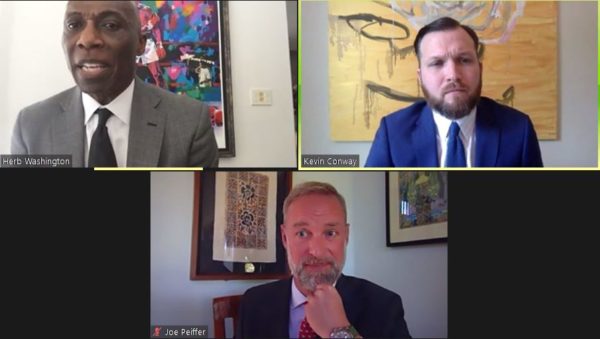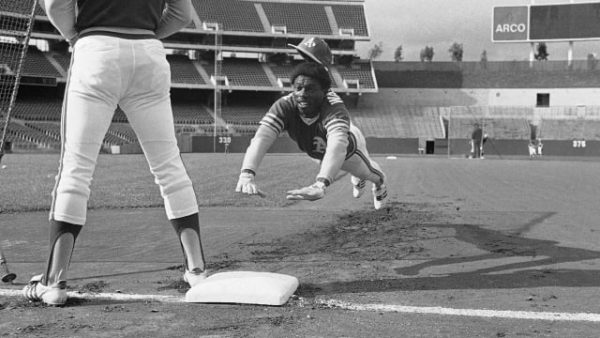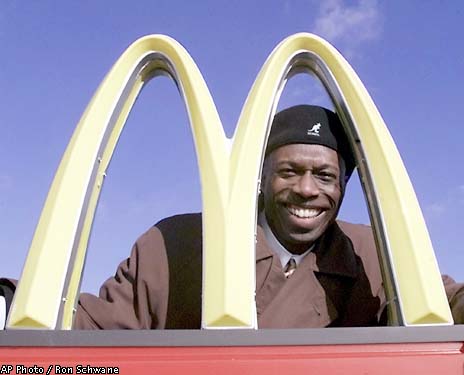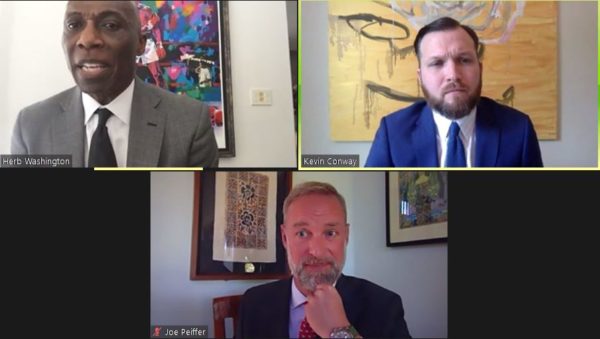‘Full-Scale Retaliation’: Black McDonald’s Franchise Owner Files Racial Discrimination Lawsuit, Saying He’s Been Redlined, Forced to Sell Restaurants to Whites
A former professional athlete who once had the largest stable of Black-owned McDonald’s franchises in the nation now claims the mega fast-food chain is trying to force him out.
Herb Washington claims McDonald’s executives targeted him after he spoke out about the corporation’s unfair treatment of Black franchisees. They’ve retaliated by pressuring him to sell seven of his restaurants to white investors over the past three years, Washington said during a news conference Tuesday, Feb. 16.

Washington announced a racial discrimination lawsuit his legal team filed against McDonald’s just before the livestreamed event Tuesday. He was flanked by Joseph Peiffer and Kevin Conway, two of his attorneys from the Peiffer Wolf Carr Kane & Conway law firm.
“McDonald’s has targeted me for extinction,” he told reporters. “The arches are in full-scale retaliation mode against me.”
Peiffer and Conway filed the civil lawsuit Tuesday in U.S. District Court for the Northern District of Ohio, asking for a declaratory judgment against McDonald’s, along with unspecified compensatory damages for Washington.
Washington, 69, was an All-American track star at Michigan State and served as a pinch-running specialist for the world champion 1974 Oakland As. He stole 29 bases in 92 games, and holds the distinction of being the lone “designated runner” in Major League history.

He began building his empire at McDonald’s in 1980 when he opened his first franchise in Rochester, New York. Washington accumulated 27 McDonald’s restaurants across New York, Pennsylvania and Ohio at the height of his success.
But the lawsuit alleges that McDonald’s “redlined” him and other Black franchise owners through a “racial steering policy” that forced them to set up shop in predominantly Black neighborhoods with lower profit margins. Washington described it as a two-tiered system. As a result, Black-owned McDonald’s locations earn $700,000 less annually than restaurants in more affluent communities that he says are carved out for white franchisees.
“While McDonald’s has joined the chorus of brands releasing hollow solidarity
statements in support of Black Lives Matter and has launched a marketing campaign
to profit from that movement, it has done nothing to change its own internal policies
that perpetuate systemic racism by disadvantaging and squeezing out its Black
franchise owners,” the complaint asserts.
Peiffer said Thomas Dentice, McDonalds’ former executive vice president, acknowledged the practice in a 1996 letter to Black franchise owners. “For business reasons we thought valid at the time, the company has placed many Black Franchisees in restaurants that have not allowed them to achieve the same level of economic success as their peers,” Dentice wrote. In the letter, he pledged to “create and implement a strategy designed to achieve parity for African American franchisees,” according to a press release from Washington’s attorneys.
Washington said he’s waited patiently on the promise of parity for decades, but it remains unfulfilled.
“I bet you didn’t know that most Black owners leave this system broke,” he said. “Most Black owners leave here with very little money because of the two-tier system.”
Washington’s suit claims McDonald’s is plucking Black franchisees from the system one by one. Peiffer said there were 377 Black owners in 1998. Today, there are just 186.
“In Herb Washington, McDonald’s met a force it cannot silence,” Peiffer said. “Nonetheless, it is trying to systematically tear down his empire.”
In September, 52 Black former franchise owners filed a discrimination lawsuit that levied similar allegations against the world’s largest restaurant chain. The class-action suit claimed McDonald’s often condemned Black franchisees to “economically depressed” locations that were dangerous, had higher overhead costs and lower top-line revenues.
The plaintiffs in that case had operated more than 200 restaurants between 1988 and 2018. They all agreed that white McDonald’s franchise owners were afforded more opportunities than their Black counterparts.
The class-action suit was one of at least four racial discrimination complaints filed against McDonald’s last year. In January 2020, two Black executives filed a claim accusing the food titan of discriminating against African-American execs and franchisees.
“In the current social climate, the stakes here are obvious,” Peiffer said. “If a Black business leader like Herb Washington will be targeted and retaliated against for speaking out against racial discrimination by a major U.S. corporation, then what Black business owner is safe.”

A McDonald’s spokesperson sent Atlanta Black Star an email Tuesday responding to Washington’s allegations.
“This situation is the result of years of mismanagement by Mr. Washington, whose organization has failed to meet many of our standards on people, operations, guest satisfaction and reinvestment,” the company statement said. “His restaurants have a public record of these issues including past health and sanitation concerns and some of the highest volumes of customer complaints in the country.”
Company officials claim they’ve invested “significant financial support” into Washington’s restaurants and given him multiple opportunities to address health code violations, customer complaints and other issues that have hampered his restaurants for several years. But they say he’s failed to raise the standards up to par.
A McDonald’s company spokesman provided Atlanta Black Star with a news link detailing sanitation woes at one of his Cleveland locations.
The Department of Public Health cracked down on that franchise in December 2018, according to 19 News, a CBS television affiliate. The agency inspected the restaurant eight times in less than three months and found rodents, mice droppings, live insects and conditions so filthy that ownership agreed to voluntarily shut down operations twice. One of those times was a three-day shutdown to clean up an infestation of rodents.
Washington did not deny the allegations when asked about McDonalds’ statement during Tuesday’s press conference. He responded to company officials in a statement of his own late Tuesday afternoon.
“When confronted with their own racism, McDonald’s attacks the Black man for allegedly having ‘dirty stores,’ ” Washington said. “How could I be an owner for 40 years if that were true? Rather than addressing my allegations, McDonald’s follows its racist playbook of retaliation.”
Washington said he’s down to 14 franchises, little more than half his record high of 27. In addition to selling seven of the restaurants to white owners, Washington claims he’s closed six others at some point at McDonalds’ behest over the years.
He said he was not allowed to buy McDonald’s locations in white neighborhoods from the beginning of his 40-year career as a franchisee. He told reporters he was relegated to breathe life into low-performing restaurants that white owners didn’t want.
Washington said when he spoke up, telling company officials about the unfair treatment of Black owners, he was told to “shut up and go back to the grill.” He went on to claim that his 35-year-old son has been shut out from buying a franchise, suggesting it’s retaliation for his criticisms.
A McDonald’s spokesman said the company offered Washington a diverse array of potential buyers. Company officials say they simply recommend locations, but franchise owners ultimately select the locations for restaurants they purchase, noting that an overwhelming amount of the transactions are handled directly between franchise owners.
“What I want to accomplish with this lawsuit is to make McDonald’s stop the systemic racism that exists and the two-tier system where Black owner operators cannot be as successful as whites,” Washington said. “There is a system for them, and there’s one for people that look like me.”

